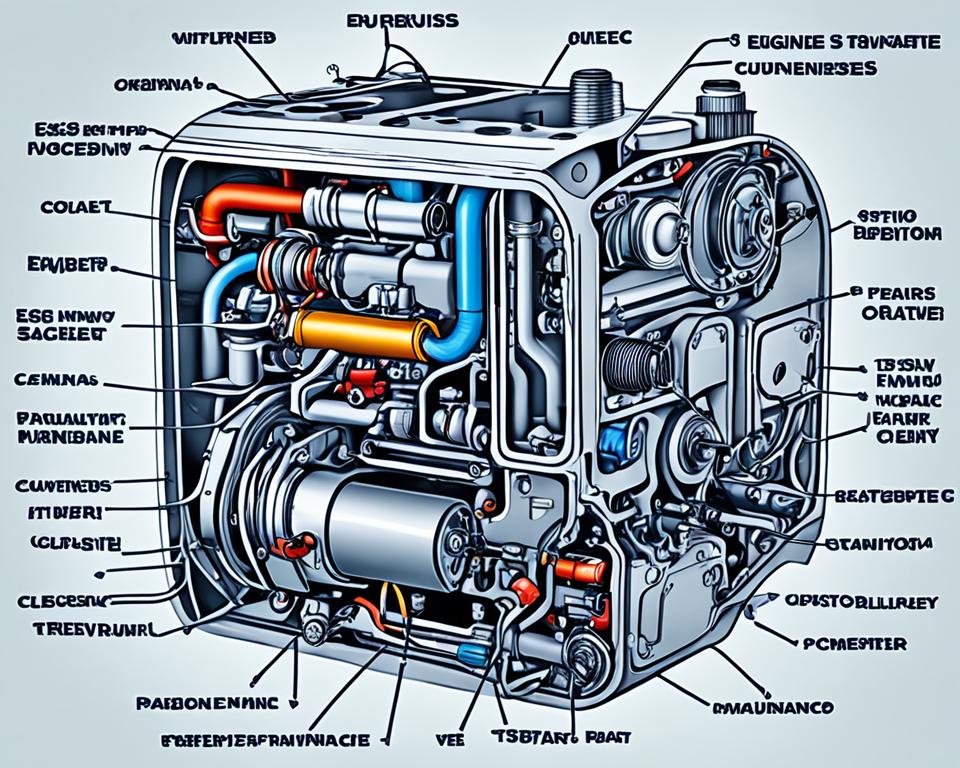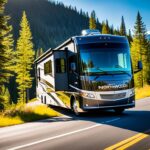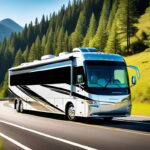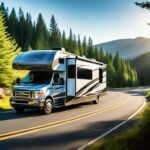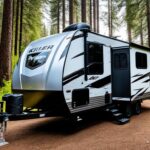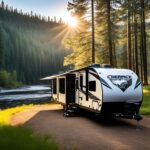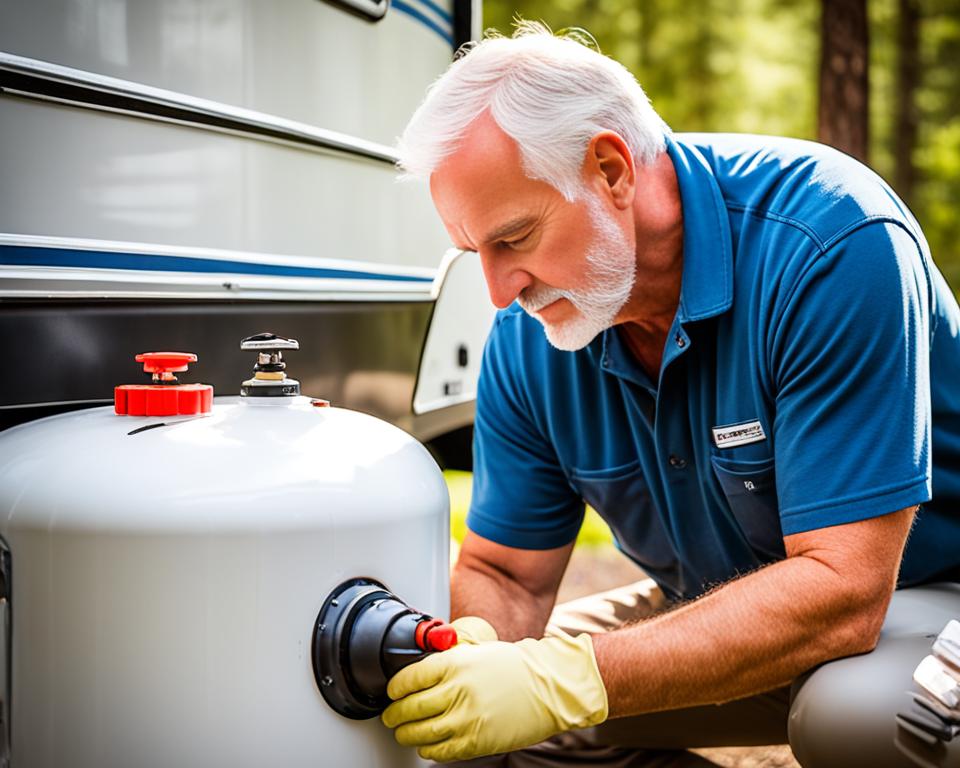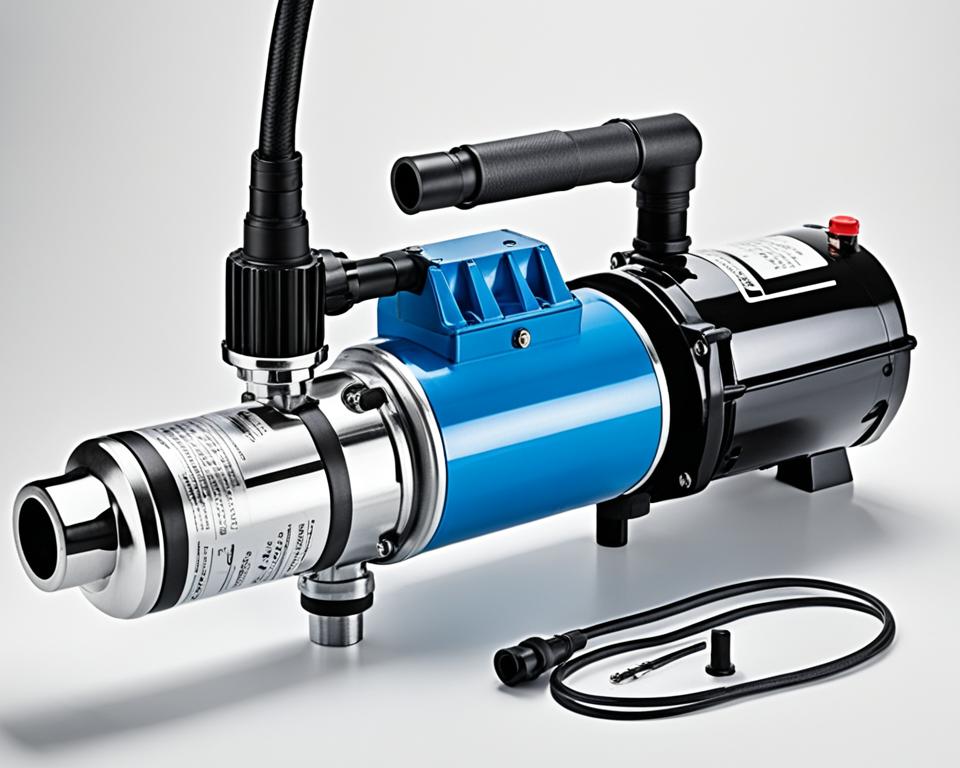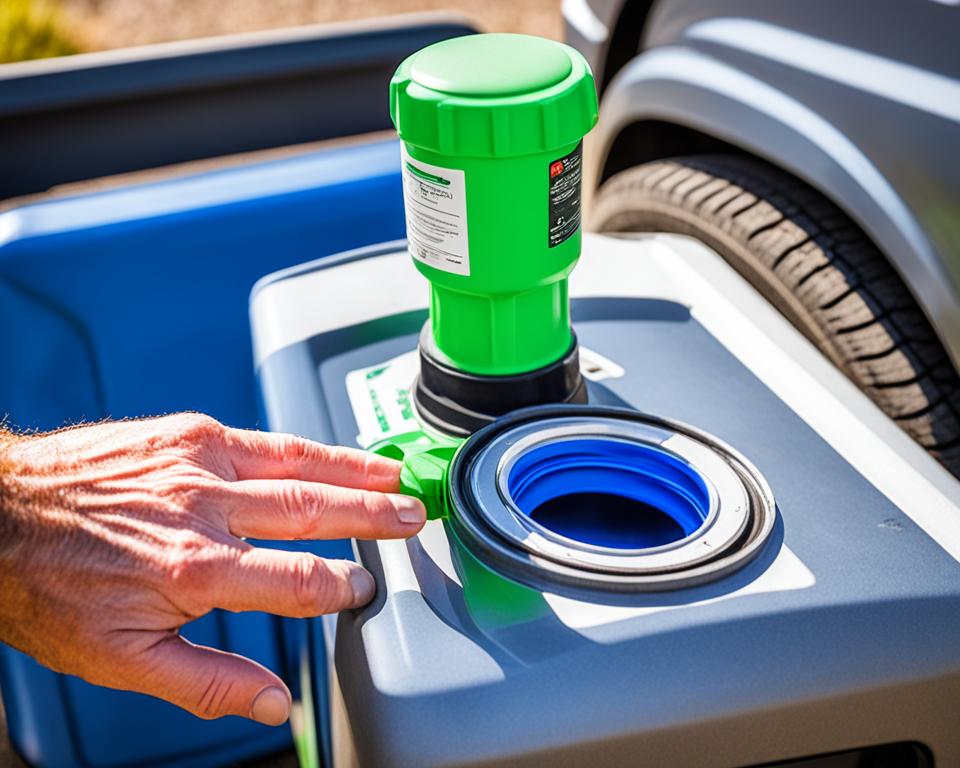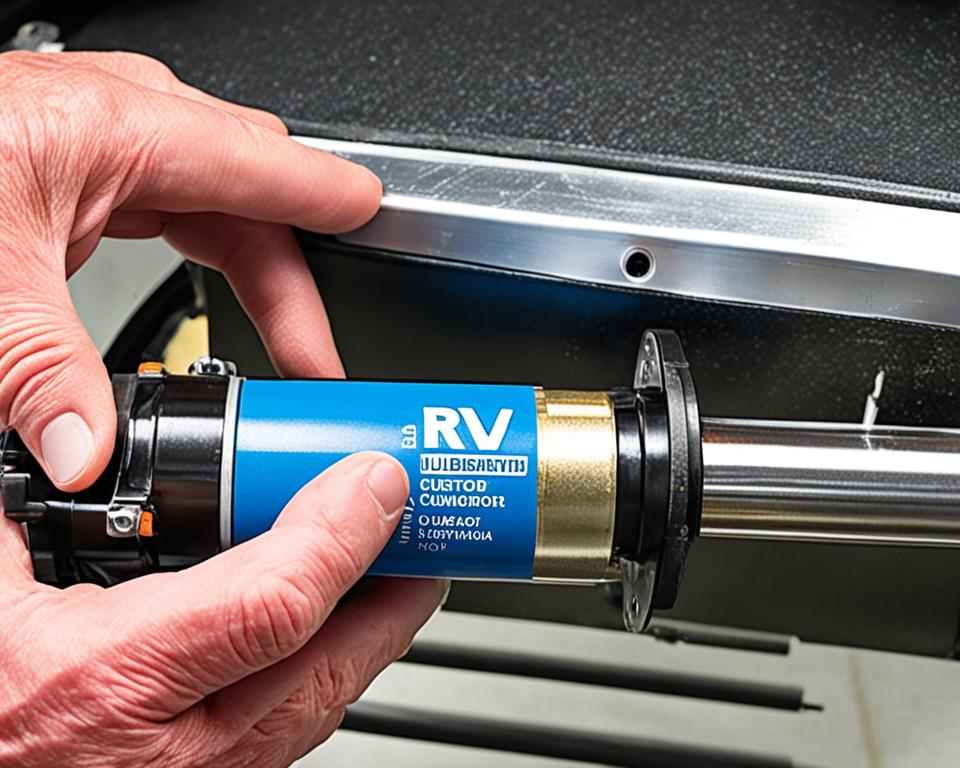Proper maintenance is essential for keeping your RV engine in top shape. By following preventive maintenance tips and implementing regular checks, you can ensure that your motorhome stays road-ready for all your adventures. In this article, we will explore the importance of preventive RV engine maintenance and provide you with a comprehensive checklist to guide you in taking care of your engine.
Key Takeaways:
- Regular preventive maintenance helps prevent costly repairs and breakdowns.
- By following a maintenance checklist, you can stay on top of necessary tasks.
- Proper tire maintenance is vital for the overall health of your RV engine.
- Climate, sun exposure, and winter conditions require specific maintenance measures.
- Rodent-proofing your RV engine can prevent damage and costly repairs.
The Importance of Preventive RV Engine Maintenance
Preventive RV engine maintenance is crucial for several reasons. Firstly, it helps prevent costly repairs and breakdowns by identifying and addressing potential issues before they become major problems. By regularly inspecting and maintaining your RV engine, you can catch small issues early on, saving you from expensive repairs down the line.
Secondly, preventive maintenance extends the lifespan of your RV engine, ultimately saving you money in the long run. Just like any other mechanical equipment, regular care and maintenance ensure that your engine operates optimally and lasts longer. By taking proactive measures to keep your engine in good condition, you’ll avoid the need for premature replacements, which can be a significant financial burden.
Lastly, preventive RV engine maintenance enhances the overall performance and efficiency of your motorhome. When your engine is well-maintained, it operates at peak performance, ensuring a smoother and more enjoyable travel experience. You’ll experience improved fuel efficiency, reduced emissions, and better acceleration, making your journey more comfortable and cost-effective.
“Preventive maintenance is like health insurance for your RV engine. It keeps it running smoothly, prevents major issues, and saves you money in the long run.”
By prioritizing preventive RV engine maintenance, you’re investing in the longevity and reliability of your motorhome. A well-maintained engine not only gives you peace of mind on the road but also maximizes the value and enjoyment you get from your RV.
Next, let’s explore an essential tool for keeping your RV engine in top shape: an RV engine maintenance checklist.
| H3: RV Engine Maintenance Checklist |
|---|
RV Engine Maintenance Checklist
Follow this comprehensive RV engine maintenance checklist to keep your motorhome in top condition. By adhering to these best practices for RV engine maintenance, you can minimize the risk of unexpected engine issues and ensure that your motorhome is always ready for your next adventure.
Fluid Levels
- Regularly check and maintain appropriate levels of engine oil, coolant, transmission fluid, and brake fluid.
- Inspect for any signs of leaks and address them promptly.
Component Inspection and Cleaning
- Inspect the air filter and replace it if dirty or clogged.
- Clean the battery terminals and ensure proper connections.
- Check the spark plugs and replace them if necessary.
- Inspect the belts and hoses for wear and tear, and replace them if damaged.
- Examine the exhaust system for any leaks or loose connections.
Tire Maintenance
- Regularly check the tire pressure and ensure they are properly inflated.
- Inspect the tires for any cuts, bulges, or signs of uneven wear.
- Rotate the tires as recommended by the manufacturer to promote even wear and extend tire life.
- Check the wheel alignment and have it adjusted if necessary.
By following this RV engine maintenance checklist, you can stay proactive in the care of your motorhome and ensure its longevity. Remember, regular maintenance is key to preventing costly repairs and keeping your engine running smoothly. Get ahead of potential issues and enjoy worry-free travels.
Easy Ways to Maintain Your RV Engine
Maintaining your RV engine doesn’t have to be complicated. By following a few simple tasks and best practices, you can ensure that your engine stays healthy and reliable for all your adventures on the road.
Regularly Check Fluid Levels
Fluids play a vital role in the proper functioning of your RV engine. Regularly check and maintain the following fluid levels:
- Engine oil: Check the oil level and follow the manufacturer’s recommendations for oil changes.
- Coolant: Monitor the coolant level and top up if necessary to prevent overheating.
- Brake fluid: Check the brake fluid level and ensure it is within the recommended range.
- Power steering fluid: If your RV has power steering, check the fluid level and refill if needed.
Change Oil and Filters Regularly
Oil is the lifeblood of your RV engine, and clean oil helps lubricate moving parts and remove debris. Regularly change the oil and filters as recommended by the manufacturer. This will help maintain optimal engine performance and extend its lifespan.
Inspect Belts and Hoses
The belts and hoses in your RV engine play a crucial role in powering various components. Regularly inspect them for signs of wear, cracks, or leaks. Replace any damaged belts or hoses promptly to prevent breakdowns and potential engine damage.
Practice Safe Driving Habits
Safe driving habits can contribute to the longevity of your RV engine. Avoid excessive idling, aggressive acceleration, and abrupt braking, as these can strain the engine and lead to increased wear and tear. Drive within the recommended speed limits and maintain a consistent speed whenever possible.
Avoid Overloading Your Motorhome
Excessive weight can put unnecessary strain on your RV engine and other components. Be mindful of the weight limits specified by the manufacturer and avoid overloading your motorhome. Distribute the weight evenly and pack only what is necessary for your trip.
Keep Up with Scheduled Maintenance
Follow the recommended maintenance schedule provided by the RV manufacturer. This includes regular engine inspections, tune-ups, and any other maintenance tasks outlined in the owner’s manual. Staying proactive with scheduled maintenance will help prevent potential issues and keep your engine running smoothly.
By incorporating these easy ways to maintain your RV engine into your routine, you can ensure a longer-lasting and more reliable engine. Taking care of your RV engine will not only provide peace of mind during your travels but also save you from costly repairs and breakdowns down the road.
RV Engine Maintenance Schedule
Creating a regular RV engine maintenance schedule is essential for proper upkeep. By following a structured maintenance plan, you can significantly extend the life of your RV engine and prevent costly repairs down the road. A well-maintained engine ensures a smooth and reliable travel experience, allowing you to enjoy your adventures without unexpected breakdowns. Here are the key tasks to include in your RV engine maintenance schedule:
1. Oil Changes
Regular oil changes are crucial for keeping your engine running smoothly. The frequency of oil changes depends on the manufacturer’s recommendations, but typically it is advisable to change the oil every 3,000 to 5,000 miles or every six months, whichever comes first. Clean oil helps lubricate engine parts, reduce friction, and remove contaminants that can cause damage.
2. Filter Replacements
Alongside oil changes, it’s important to replace the filters in your RV engine. This includes the air filter, fuel filter, and oil filter. Clean filters ensure proper airflow, fuel delivery, and oil purity, maximizing the performance and longevity of your engine. Refer to your RV’s manual or consult with a qualified mechanic for the recommended filter replacement schedule.
3. Tire Rotations
Regular tire rotations help achieve even wear on your RV’s tires, extending their lifespan and ensuring optimal performance. Rotate your tires according to the manufacturer’s recommendations or at least every 5,000 to 7,000 miles. This practice helps maintain proper traction, stability, and fuel efficiency, contributing to a smoother and safer ride.
4. Overall Inspections
Performing overall inspections of your RV engine is essential to catch potential issues before they escalate. Regularly check for leaks, loose connections, worn-out belts, and any abnormal sounds or vibrations. Inspect the cooling system, battery, and electrical components for signs of deterioration or damage. It’s advisable to have your engine thoroughly inspected by a qualified mechanic at least once a year.
| Maintenance Task | Frequency |
|---|---|
| Oil Changes | Every 3,000 – 5,000 miles or every six months |
| Filter Replacements | As recommended by the manufacturer |
| Tire Rotations | Every 5,000 – 7,000 miles |
| Overall Inspections | At least once a year |
By adhering to a well-planned RV engine maintenance schedule, you are taking proactive steps to ensure the longevity and reliability of your motorhome. Regular oil changes, filter replacements, tire rotations, and overall inspections will help you catch potential problems early on, enabling you to address them promptly and extend the life of your RV engine. With proper maintenance, you can embark on your adventures with peace of mind, knowing that your engine is in optimal condition.
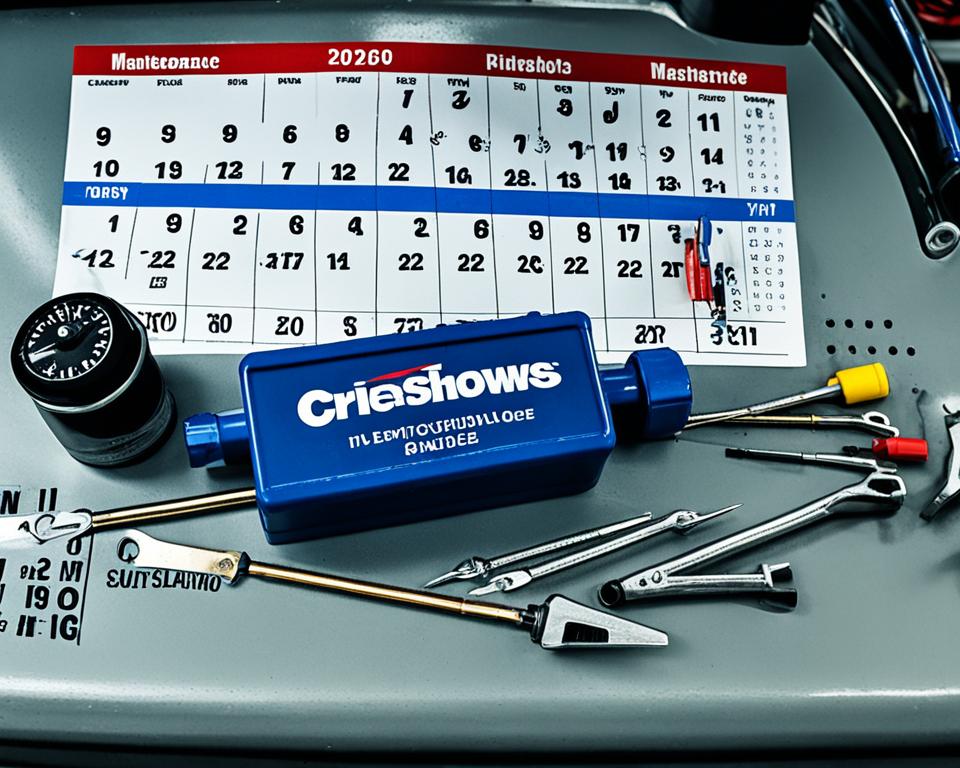
The Role of Proper Tire Maintenance in RV Engine Health
Proper tire maintenance plays a crucial role in ensuring the overall health of your RV engine. By regularly checking tire pressure, inspecting for signs of wear and damage, and ensuring proper alignment and balancing, you can prevent tire blowouts and other tire-related issues that can negatively impact your engine’s performance and longevity.
When it comes to RV engine maintenance, the importance of tire maintenance cannot be overstated. Your tires are the direct connection between your motorhome and the road, bearing the weight of your vehicle and providing traction and stability. Neglecting tire maintenance can lead to uneven tire wear, decreased fuel efficiency, and even accidents on the road.
Regularly checking tire pressure is one of the most important aspects of tire maintenance. Underinflated tires can put excessive strain on your engine, causing it to work harder to propel the RV forward. This can result in decreased fuel efficiency and increased engine wear. On the other hand, overinflated tires can lead to a harsher ride, reduced braking efficiency, and uneven tire wear.
In addition to tire pressure, regularly inspecting your tires for signs of wear and damage is crucial. Look for tread wear indicators, bulges, cracks, or any other abnormalities that may indicate the need for replacement. Uneven tread wear can affect the balance and stability of your RV, putting additional strain on your engine and affecting its overall performance.
Proper tire alignment and balancing also play a significant role in RV engine health. Misaligned tires can cause uneven tire wear, reduced fuel efficiency, and increased strain on your engine. Balancing your tires ensures that weight is distributed evenly, preventing vibration and minimizing stress on the engine and other components.
By taking care of your tires and ensuring proper maintenance, you are effectively safeguarding your RV engine and reducing the risk of costly repairs or breakdowns. Remember to include tire maintenance as part of your regular RV engine maintenance routine.
The Impact of Climate and Humidity on RV Engine Maintenance
When it comes to RV engine maintenance, two factors that shouldn’t be overlooked are climate and humidity. These environmental conditions can have a significant impact on the performance and longevity of your RV engine, making it essential to understand their effects and take necessary precautions to ensure optimal maintenance.
Extreme temperatures, whether scorching heat or freezing cold, can put additional strain on your RV engine. High temperatures can cause overheating and excessive wear on engine components, while extremely cold temperatures can affect the lubrication of moving parts, making them more susceptible to damage. By monitoring the climate and adjusting your maintenance routine accordingly, you can help prevent potential engine issues caused by extreme temperatures.
“Proper cooling system maintenance is crucial in climates with extreme temperatures. Regularly inspect radiator hoses and belts, check the coolant levels, and clean or replace the radiator’s fins to ensure efficient heat dissipation.”
Humidity, especially in hot and humid environments, can also pose a challenge to RV engine maintenance. Moisture buildup can occur, leading to corrosion and damage to engine components. This is particularly true in areas with high humidity levels, where the risk of condensation is higher. To protect your RV engine from the detrimental effects of humidity, it’s important to implement preventive measures such as:
- Keeping the engine compartment well-ventilated to promote air circulation and reduce moisture buildup.
- Using dehumidifiers or moisture-absorbing products in areas prone to humidity.
- Regularly inspecting and cleaning the air intake system to prevent debris and moisture from entering the engine.
By prioritizing climate and humidity considerations in your RV engine maintenance routine, you can minimize the risk of engine damage and ensure smooth travels on your adventures.
The Role of Sun Protection in RV Engine Maintenance
Sun exposure can have detrimental effects on your RV engine. The powerful UV rays can lead to paint fading, fiberglass cracking, and damage to decals, which not only impacts the aesthetics of your motorhome but also the overall maintenance of your engine. It’s crucial to provide adequate sun protection for your RV to mitigate these risks and ensure the longevity of your engine.
An effective way to protect your RV engine from the sun is by parking in shaded areas whenever possible. By avoiding direct exposure to sunlight, you can minimize the harmful effects of UV rays on your motorhome’s exterior and internal components. If finding shaded spots is challenging, consider using covering devices such as RV covers or awnings. These protective accessories shield your motorhome from the sun’s rays, preventing potential damage and maintaining the integrity of your engine.
Regularly Waxing Your RV
In addition to parking in shaded areas and using covering devices, regularly waxing your RV is an essential step in sun protection for your engine. Waxing creates a protective barrier on the exterior surfaces of your motorhome, acting as a shield against UV rays, dirt, and other environmental elements. By applying a high-quality wax product every few months, you can ensure that your RV’s paint and fiberglass remain protected, preventing premature deterioration and preserving the appearance of your motorhome.
Remember to choose a wax product specifically designed for RVs, as they often contain additional UV inhibitors and are formulated to withstand the unique challenges faced by motorhomes.
By implementing sun protection measures like parking in shaded areas, using covering devices, and regularly waxing your RV, you can safeguard the exterior surfaces of your motorhome and protect your engine from the harmful effects of sun exposure. Prioritizing sun protection as part of your RV engine maintenance routine will contribute to the longevity, performance, and overall reliability of your motorhome.
The Importance of Winterizing for RV Engine Maintenance
Winterizing your RV is a vital step in maintaining your RV engine, especially in cold climates. Taking the necessary precautions to protect your motorhome during the winter months can help prevent damage to your engine and other components, ensuring that your RV is ready to hit the road when spring arrives.
Properly winterizing your motorhome involves a few essential tasks:
- Draining the water systems: This includes draining the freshwater tanks, hot water heater, and all water lines to prevent freezing and potential damage.
- Protecting pipes and hoses: Insulate exposed pipes and hoses using foam pipe insulation or heat tape to prevent freezing and bursting.
- Using antifreeze when necessary: Adding RV antifreeze to your plumbing system can provide an extra layer of protection against freezing temperatures. Be sure to follow the manufacturer’s instructions for the correct amount and method of application.
By winterizing your RV engine, you can safeguard it from the harsh conditions of winter and avoid costly repairs or replacements. It’s important to note that winterizing practices may vary based on the specific make and model of your RV, so consulting your owner’s manual or seeking professional advice is recommended.
Protect Your RV Engine with Winterization
Winterizing your RV engine is like giving it a cozy blanket to weather the cold. Taking the time to perform these winterization steps can provide peace of mind knowing that your engine and other vital components are protected. It’s a proactive measure that can save you time, money, and unnecessary stress down the road.
Proper winterization is the key to ensuring that your RV engine remains in top shape throughout the winter months.
Now that you understand the importance of winterizing for RV engine maintenance, let’s explore other proactive measures you can take to rodent-proof your RV engine and protect your motorhome from unwanted critters.
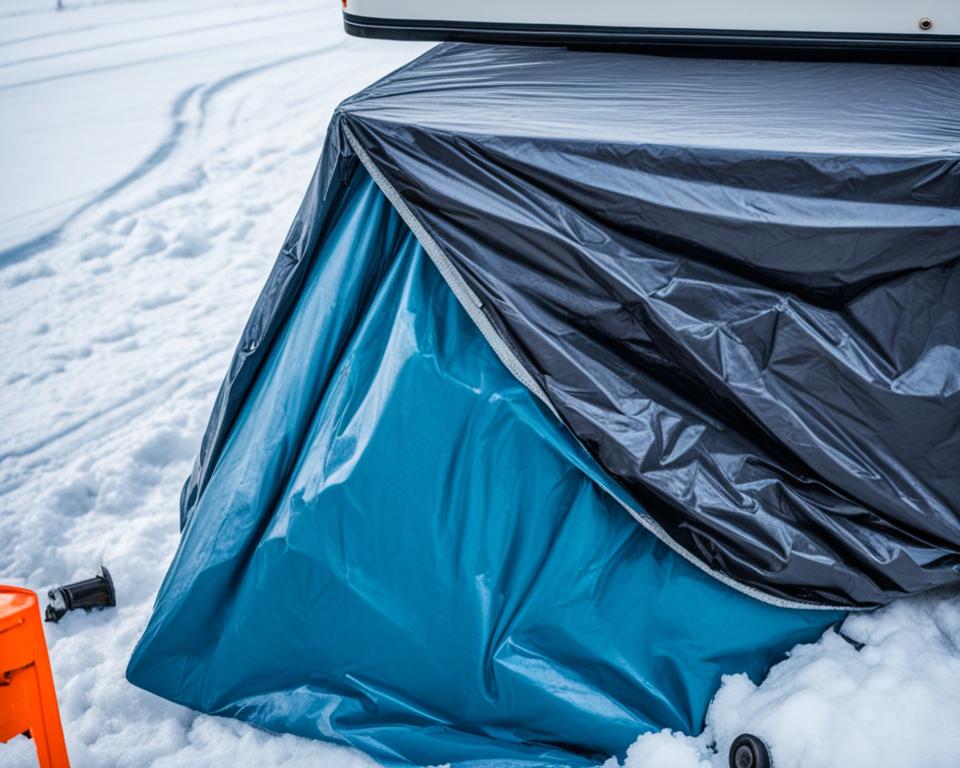
Proactive Measures to Rodent-Proof Your RV Engine
Rodents can wreak havoc on your RV engine, causing extensive damage by gnawing on wires and nesting in crucial components. Protecting your motorhome from rodents requires proactive measures to minimize the risk of costly repairs and disruptions. By implementing the following strategies, you can safeguard your RV engine and enjoy worry-free travels.
1. Seal Entry Points
To prevent rodents from entering your RV engine, inspect and seal any possible entry points. Use silicone caulk or steel wool to fill gaps, cracks, and openings around pipes, wires, and other vulnerable areas. Pay close attention to areas where utility lines enter your motorhome and ensure they are properly sealed.
2. Use Deterrents and Traps
Deploying rodent deterrents and traps can effectively keep pests away from your RV engine. Consider using natural repellents like peppermint oil or mothballs, as rodents dislike the strong scents. Place traps near potential entry points or areas where rodent activity has been observed. Check the traps regularly and dispose of captured rodents safely.
3. Keep Your RV Clean
Maintaining a clean environment is crucial in rodent-proofing your RV engine. Remove all food sources and debris from your motorhome as rodents are attracted to crumbs and leftovers. Vacuum and wipe down surfaces regularly to eliminate crumbs and odors that may entice pests. Additionally, store food in sealed containers to prevent easy access for rats or mice.
| Rodent-Proofing Tips | |
|---|---|
| Seal entry points | Use deterrence and traps |
| Keep your RV clean | Store food in sealed containers |
Implementing these proactive measures can greatly reduce the risk of rodent damage to your RV engine. By sealing entry points, using deterrents and traps, and maintaining cleanliness, you can enjoy the peace of mind that comes with knowing your motorhome is protected from costly rodent-related issues.
Remember, taking preventive action is essential for the longevity and performance of your RV engine. By following the tips and guidelines in this article, you can effectively maintain your motorhome and enjoy worry-free adventures on the open road.
Conclusion
Proper preventive RV engine maintenance is crucial for ensuring the longevity and optimal performance of your motorhome. By following the preventive RV engine maintenance tips and guidelines outlined in this article, you can keep your RV engine in top condition and minimize the risk of unexpected breakdowns. This, in turn, will lead to more enjoyable and hassle-free travels.
Remember, prevention is key when it comes to maintaining your RV engine. Regularly inspecting, cleaning, and servicing your motorhome should be a priority to keep it running smoothly for years to come. Adhering to a maintenance schedule, checking fluid levels, changing oil and filters as recommended, and regularly inspecting belts and hoses are simple yet effective ways to ensure the health of your engine.
Additionally, giving due attention to tire maintenance, protecting your RV engine from extreme climates and sun exposure, and taking proactive steps to rodent-proof your motorhome are essential aspects of comprehensive RV engine maintenance. By implementing these preventive measures, you can protect your investment, avoid costly repairs, and enjoy worry-free adventures on the open road.
FAQ
What is preventive RV engine maintenance?
Preventive RV engine maintenance involves performing regular checks and maintenance tasks to prevent potential problems and prolong the life of your RV engine.
Why is preventive RV engine maintenance important?
Preventive RV engine maintenance is important because it helps prevent costly repairs and breakdowns, extends the lifespan of your RV engine, and enhances overall performance and efficiency.
What should be included in an RV engine maintenance checklist?
An RV engine maintenance checklist should include tasks such as checking fluid levels, inspecting and cleaning various components, and ensuring proper tire maintenance.
What are some easy ways to maintain your RV engine?
Some easy ways to maintain your RV engine include regularly checking fluid levels, changing oil and filters as recommended, and inspecting belts and hoses.
How can I create a RV engine maintenance schedule?
To create an RV engine maintenance schedule, include tasks such as oil changes, filter replacements, tire rotations, and overall inspections.
Why is proper tire maintenance important for RV engine health?
Proper tire maintenance is important for RV engine health because it prevents tire blowouts and other tire-related issues that can negatively impact your engine.
What is the impact of climate and humidity on RV engine maintenance?
Extreme temperatures and humidity can put additional strain on your RV engine. Taking necessary precautions, such as proper cooling system maintenance, can help protect your engine.
How does sun exposure affect RV engine maintenance?
Sun exposure can cause damage to the exterior of your RV engine. Providing adequate sun protection, such as parking in shaded areas or using RV covers, can help preserve your engine.
Why is winterizing important for RV engine maintenance?
Winterizing your RV engine is important in cold climates to prevent damage from freezing temperatures. Properly draining water systems and using antifreeze can protect your engine.
How can I rodent-proof my RV engine?
To rodent-proof your RV engine, seal any entry points, use deterrents and traps, and keep your motorhome clean and free of food sources that may attract pests.

